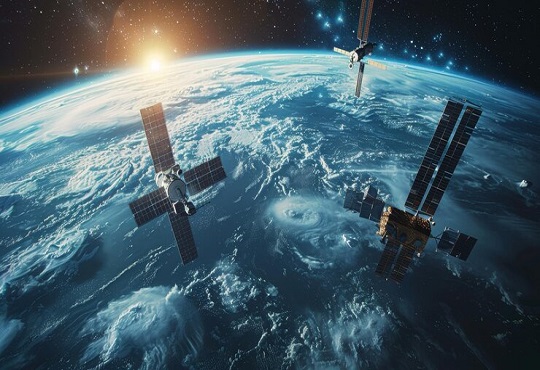Global Satcom Giants Target India's $2.3 Billion Market Boom
CIOTech Outlook Team | Wednesday, 13 August 2025, 05:44 IST

- India's satcom market to hit $20B by 2028 via direct-to-cell tech.
- Global operators resell capacity to compete against Starlink in India.
- Nelco partners with OneWeb and KT SAT for multi-orbit services.
The $2.3 billion satcom market in India is expected to nearly tenfold to reach $20 billion by 2028, and international satellite operators are competing for a share of this market, driven by the advent of direct-to-cell communications. This technology enables satellite signals to connect directly to mobile phones, promising widespread broadband access.
Operators such as Luxembourg's Intelsat, the UK's Inmarsat, Singapore Telecom, Korea's KT SAT, Thailand's IPSTAR, and Indonesia's PT Telekomunikasi are ramping up satellite capacity in India. They plan to resell this capacity to major satcom providers, enabling them to deliver broadband-from-space services to millions of consumers. Although not all are direct competitors, these partnerships could enhance capacities to challenge Elon Musk's Starlink, the global leader in satcom.
Currently, Starlink, the Reliance Jio-SES joint venture, and Bharti Group-backed Eutelsat OneWeb hold the required approvals to offer services in India. Amazon's Kuiper and Apple partner Globalstar have also submitted permit applications.
“Nelco uses multiple GEO satellites Indian as well as foreign to offer satcom services in India,” said PJ Nath, Managing Director and Chief Executive Officer of Nelco. “The KT-Sat is one of the satellites on which it has procured capacity, which has been authorized by IN-SPACe.”
Also Read: India’s Space Regulator Picks Google-Backed Pixxel for Satellites
Nath added that Nelco aims for multi-orbit communications: “While it has access to a large amount of GEO satellite capacities, the OneWeb partnership will offer the LEO satellite capacity. The satcom services, whether GEO or LEO satellite-based or a combination of GEO & LEO, will depend on the specific use cases and application requirements.”
US-based Viasat, which bought Inmarsat in 2023, has integrated Inmarsat satellites for the market. “We will utilise our unique approach and extensive expertise to make a significant impact by using advanced satellite technology to help connect the most remote and hard-to-reach regions in partnership with top technology and manufacturing companies in India,” said Gautam Sharma, Managing Director, Viasat India.
This surge aligns with India's satcom boom, with services expected to launch later this year pending spectrum allocation. Jefferies puts the initial subscriber range at 180,000 with a projected 5.7 million by 2030. India is the biggest untapped land where foreign satcoms can be implemented since Russia and China do not allow such activities, so there must be a large capacity to cover the entire nation.




.jpg)